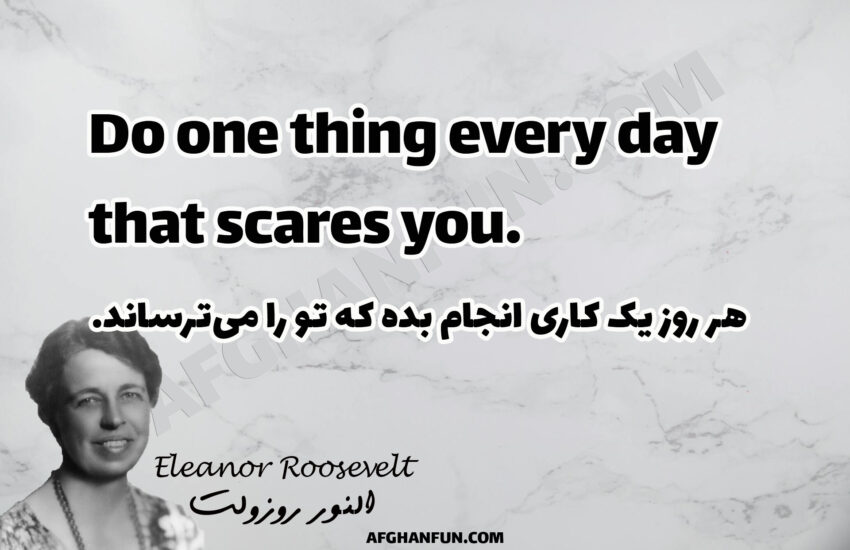If life were predictable it would cease to be life, and be without flavor.
Eleanor Roosevelt
اگر زندگی قابل پیش بینی باشد، زندگی بدون عطر و طعم و متوقف خواهد شد.
النور روزولت
این جمله، بیان زیبایی از اهمیت عدم قطعیت و پیشبینیناپذیری در زندگی است. به زبان سادهتر، جمله میگوید که اگر همه اتفاقات زندگی از قبل مشخص و قابل پیشبینی بود، زندگی دیگر هیجان، چالش و جذابیت خود را از دست میداد و به یک روال تکراری و خستهکننده تبدیل میشد.
Агар зиндагии қобили пешбинӣ бошад, зиндагӣ бидӯни атр у таъм у мутаваққиф хоҳад шуд.
Элеонор Рузвелт
Агар ҳаёт пурра пешгӯӣ карда шавад ва ҳеч гуна тағйирот ва ҳодисаи ногаҳонӣ дар он рух надиҳад, он гоҳ ҳаёт маънои худро гум мекунад. моҳият ва лаззати зиндагӣ дар ҳамон тағйирот, ҳаяҷонҳо ва таҷрибаҳои нав аст, ки мо интизори он нестем. Агар ҳама чиз аз пеш муайян бошад, он гоҳ ҳаёт ба як роҳи такрорӣ ва беҳаракат табдил мешавад, ки дар он ҷо ҳеҷ гуна рушд ва кашф вуҷуд надорад.
.لو كانت الحياة متوقّعة لتوقّفت عن كونها حياة، وكانت من دون طعم
إليانور روزفلت
إذا كانت الحياة يمكن التنبؤ بها بالكامل ولم تحدث أي تغييرات أو أحداث مفاجئة فيها، فإن الحياة تفقد معناها. جوهر ومتعة الحياة تكمن في تلك التغيرات والإثارات والتجارب الجديدة التي لا نتوقعها. إذا كان كل شيء محددًا مسبقًا، فإن الحياة تتحول إلى روتين ممل ثابت، لا يوجد فيه أي نمو أو اكتشاف.
ببساطة: إذا كانت الحياة مثل كتاب مكتوب مسبقًا نقرأه فقط، فإن الحياة لن تكون ممتعة بعد الآن.
This quote, often attributed to Eleanor Roosevelt, suggests that unpredictability is a fundamental aspect of life that gives it depth, excitement, and meaning. Let’s break it down:
1. “If life were predictable…”
Predictability implies routine, certainty, and no surprises. In a world where everything is foreseen and controlled, there’s no room for the unexpected. While some predictability is essential (like in planning), the quote argues that an entirely predictable life would be monotonous and devoid of the essence that makes life dynamic.
2. “…it would cease to be life…”
Life, as we experience it, is filled with unknowns, challenges, joys, and changes. If it were entirely predictable, it would lose the qualities that make it “life.” The ups and downs, the opportunities for growth, learning, and resilience would disappear. In other words, a predictable life would be more like a mechanical process than a living experience.
3. “…and be without flavor.”
Flavor here is a metaphor for the richness and excitement of life. Just like a dish needs spices and variety to be flavorful, life needs surprises, change, and unpredictability to be engaging and meaningful. The “flavor” refers to the complexity, joy, and depth that come from not knowing what will happen next—those moments that surprise, challenge, and delight us.
The Core Message:
The core idea of this quote is that unpredictability—what makes life uncertain and full of surprises—is not a flaw or something to be feared, but rather a defining characteristic of what makes life worth living. Without it, life would become dull, repetitive, and static. The unpredictability is what infuses life with meaning, excitement, and richness.
This idea is similar to what is often expressed in existential philosophy, where the unknown and the spontaneous are seen as central to creating authentic human experiences. Whether it’s the joy of discovery, the thrill of the unknown, or the growth that comes from overcoming challenges, these unpredictable elements give life its unique flavor.
Eleanor Roosevelt (born October 11, 1884 – November 7, 1962) was a pioneering figure in American history, known for her work as a First Lady, diplomat, and human rights advocate. Here’s an overview of her life and legacy:
Early Life and Background:
- Born in New York City into a prominent family, Eleanor Roosevelt was the niece of Theodore Roosevelt, the 26th President of the United States.
- She had a challenging childhood, marked by the early deaths of both her parents (her mother in 1892 and her father in 1894), which left her emotionally scarred. She was raised by her maternal grandmother and was largely isolated and introverted during her youth.
- Eleanor attended Allenswood Academy in London, where she thrived academically and developed a strong sense of independence.
Marriage to Franklin D. Roosevelt:
- In 1905, she married her distant cousin, Franklin D. Roosevelt, who later became the 32nd President of the United States.
- The Roosevelts had six children, though their marriage was complicated. Franklin contracted polio in 1921, and Eleanor became increasingly independent, taking on a larger public role.
- Eleanor’s relationship with Franklin was both a partnership and a challenge. While Franklin had a number of infidelities, Eleanor found her own path through public service and social activism.
Role as First Lady (1933-1945):
- When Franklin became president in 1933, Eleanor redefined the role of First Lady. She was far more active and outspoken than her predecessors, choosing not to be a passive observer of her husband’s political career.
- She used her position to champion civil rights, women’s rights, and labor rights, advocating for the poor and marginalized during the Great Depression.
- Eleanor gave regular press conferences and wrote a popular newspaper column, “My Day”, which addressed a wide range of topics, from politics to social issues.
- She was an advocate for New Deal programs that provided aid to struggling Americans, particularly women and minorities.
Advocacy for Human Rights:
- Beyond her work as First Lady, Eleanor became a tireless advocate for human rights and social justice.
- In 1945, after Franklin’s death, she was appointed as a delegate to the United Nations General Assembly, where she became the first chairperson of the United Nations Commission on Human Rights.
- One of her most notable achievements in this role was her leadership in drafting and promoting the Universal Declaration of Human Rights in 1948. This declaration set out fundamental human rights that should be protected for all people, regardless of race, nationality, or religion.
Civil Rights and Social Justice:
- Eleanor was an outspoken advocate for racial equality, particularly during the civil rights struggles of the 1940s and 1950s.
- She supported anti-lynching legislation and took steps to challenge racial segregation in her public and private life.
- She worked closely with African American leaders like Mary McLeod Bethune and W.E.B. Du Bois and pushed for greater inclusion of African Americans in government and social programs.
- Despite facing criticism for her activism, particularly from Southern Democrats, Eleanor remained steadfast in her commitment to racial justice.
Later Life and Legacy:
- After leaving the role of First Lady, Eleanor continued her activism, focusing on human rights, civil rights, and promoting the welfare of women and children.
- She was a prolific author and speaker, writing numerous books, essays, and articles on topics ranging from politics to personal reflection.
- In 1961, Eleanor was appointed by President John F. Kennedy to the Presidential Commission on the Status of Women, which worked to address gender inequality.
- Eleanor Roosevelt passed away on November 7, 1962, at the age of 78. She is remembered as one of the most influential women in American history and a global symbol of compassion, determination, and commitment to human dignity.
Key Contributions:
- Human Rights Advocacy: Instrumental in drafting the Universal Declaration of Human Rights.
- First Lady of Action: Redefined the role of First Lady with her activism and public engagement.
- Civil Rights Champion: Fought against racial discrimination and advocated for the rights of African Americans.
- Women’s Rights: Focused on gender equality and worked to improve women’s social, economic, and political standing.
- Social Justice: Championed the rights of the poor, the oppressed, and marginalized communities.
Quotes:
- “The future belongs to those who believe in the beauty of their dreams.”
- “You must do the thing you think you cannot do.”
- “It is not fair to ask of others what you are not willing to do yourself.”
Eleanor Roosevelt’s legacy is far-reaching. She was not only a political figure but also a deeply compassionate individual who reshaped the role of women in public life and left an indelible mark on the global human rights movement. Her work continues to inspire movements for equality and justice around the world.











